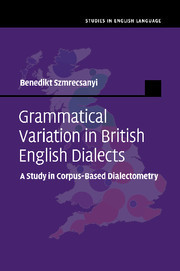Description
Grammatical Variation in British English Dialects
A Study in Corpus-Based Dialectometry
Studies in English Language Series
Author: Szmrecsanyi Benedikt
An exploration of grammatical differences between British English dialects, drawing on authentic speech data collected in over thirty counties.
Language: English
Subject for Grammatical Variation in British English Dialects:
Approximative price 41.94 €
In Print (Delivery period: 14 days).
Add to cart
Grammatical Variation in British English Dialects
Publication date: 03-2015
Support: Print on demand
Publication date: 03-2015
Support: Print on demand
Grammatical Variation in British English Dialects
Publication date: 10-2012
227 p. · 15.5x23.4 cm · Hardback
Publication date: 10-2012
227 p. · 15.5x23.4 cm · Hardback
Description
/li>Contents
/li>Biography
/li>
Variation within the English language is a vast research area, of which dialectology, the study of geographic variation, is a significant part. This book explores grammatical differences between British English dialects, drawing on authentic speech data collected in over thirty counties. In doing so it presents a new approach known as 'corpus-based dialectometry', which focuses on the joint quantitative measurement of dozens of grammatical features to gauge regional differences. These features include, for example, multiple negation (e.g. don't you make no damn mistake), non-standard verbal-s (e.g. so I says, What have you to do?), or non-standard weak past tense and past participle forms (e.g. they knowed all about these things). Utilizing state-of-the-art dialectometrical analysis and visualization techniques, the book is original both in terms of its fundamental research question ('What are the large-scale patterns of grammatical variability in British English dialects?') and in terms of its methodology.
1. Introduction; 2. Data and methods; 3. The feature catalogue; 4. Surveying the forest; 5. Is morphosyntactic variability gradient? Exploring dialect continua; 6. Classification: the dialect area scenario; 7. Back to the features; 8. Summary and discussion; 9. Outlook and concluding remarks.
Benedikt Szmrecsanyi studied English Philology, Political Science, and Economics at the University of Freiburg (Germany) and at Georgetown University (Washington DC). He holds M.A. and Ph.D. degrees in English Philology from the University of Freiburg. Until 2012, he did postdoctoral research at the Freiburg Institute for Advanced Studies, before taking up a lectureship in English linguistics at the University of Manchester. He joined the University of Leuven in autumn 2013.
© 2024 LAVOISIER S.A.S.




